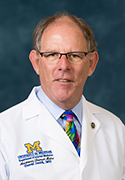David Smith retires with a legacy of compassionate patient care
contributed by Eric Olsen | Media contact: Anna Megdell, 734-764-2220 | Patients may contact Cancer AnswerLine™ 800-865-1125
After 28 years at the University of Michigan, David Smith, M.D., will retire later this fall.

Smith most recently served as chief medical officer at Rogel Cancer Center and associate chief clinical officer for cancer at Michigan Medicine. He trained at the University of Washington in Seattle, and then completed a fellowship in hematology/oncology at Duke University. Prior to coming to Michigan, he was a member of the faculty at the University of Pittsburgh School of Medicine and UPMC Hillman Cancer Center. He joined the U-M in January 1996.
“I began seeing patients in the cancer center a year later when the building opened,” he said. “I think there are only a handful of us who were there at that time and are still seeing patients.”
Focusing on urologic oncology and clinical trials, Smith took on several key roles at the cancer center, including as medical director of the Clinical Trials Support Office (CTSO) and building a solid tumor Phase I clinical trials program.
“I got to work with an incredible group of people,” Smith said. “At its peak we were able to offer novel therapies to almost 90 patients per year and contributed to the development of several drugs that are in clinical practice, including some that have become first-line therapies and have changed cancer care.”
He credits a mentor at Pittsburgh for guidance. “The most important mentor I had was Skip Trump. Skip was my research and clinical mentor during fellowship and continued during my first faculty job at the University of Pittsburgh. I learned how to develop and design clinical trials and incorporate science into clinical questions from Skip. I also learned that no matter how important the question is to us as clinical trialists, we can never lose site of the fact that our subjects are people.”
Colleague Daniel Hayes, M.D., said Smith’s contributions were substantial. "He really thoughtfully revised a lot of the things that we did and how we did it, making it a much better program."
During the COVID-19 pandemic, Smith was part of a team that worked to keep the clinics and infusion area operating and providing care for patients, while simultaneously ensuring staff and patient safety in the face of a then-unknown threat.
In addition to his administrative duties, Smith’s reputation as a clinician and mentor elicits strong praise from his colleagues. Lynn Henry, M.D., Ph.D., recalls his compassionate and patient-first approach to care as the reason she sought him out as a mentor during her fellowship. She emphasized that his mentorship had a profound impact on fellows and early-career faculty, teaching them to develop clinical trials and grow into effective, compassionate clinicians.
"He was very compassionate when taking care of his patients. I thought that he had their genuine best interest at heart," she said.
Henry worked closely with Smith as he managed substantial administrative responsibilities. "He always had the best interest of the faculty and our patients as his guide," she noted. Smith's leadership style was consultative and inclusive, qualities that Henry found particularly valuable. "He’s very good at seeing all sides of a situation, taking into account different perspectives, and coming up with the best possible decision based on what you have available."
Both Hayes and Henry agree that Smith’s legacy is heavily anchored in his excellence as a physician. "He took really good care of patients,” said Hayes. “His patients would walk over hot coals for him, and I would too."
Henry concurs. "He was willing to step up without skipping a beat. He quickly got up to speed on a new tumor type and provided superb care," she explained. “His willingness to adapt and prioritize patient care over personal convenience displayed his selflessness and commitment.”
Reflecting on Smith’s impending retirement, Henry and Hayes both expressed a mix of admiration and gratitude. "He’s been a very good colleague and collaborator. I’ve appreciated everything he’s done for the institution, for the division, and I’m glad he will still be around even as he transitions to retirement," said Henry.
"He has been an integral part of numerous initiatives, and his work has had a far-reaching impact not just at the University of Michigan, but globally," said Hayes. “His legacy will be that he was a great doctor.”
For his part, Smith is looking forward to spending more with his children and grandchildren, as well as the opportunity for more travel. He says his favorite memories of his time in medicine involve patients and the people he has worked with.
“I have had the privilege of taking care of and knowing extraordinary people who happened to have cancer,” he said. “Over the years I have also been lucky to work with gifted and dedicated people who have been kind to their patients and to me. Those are the ones who I will remember.”
